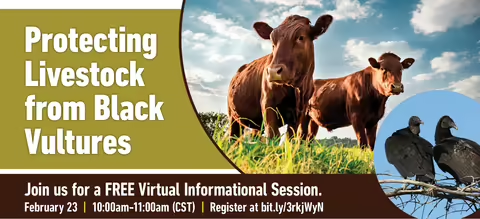URBANA, Ill. – Vultures can be costly to livestock producers, but as federally-protected migratory birds, their control is complicated. Estimates place the annual loss to livestock producers at $300,000 to $500,000.
USDA reports from 2015 indicate that 24,600 calf deaths and another 2,170 cow deaths were due to vultures. The Farm Journal reported in 2019 that vulture attacks are escalating in Illinois, Indiana, and Ohio.
To help producers understand the regulations and options available to protect livestock, the Illinois Farm Bureau, University of Illinois Extension, and the USDA Animal and Plant Health Inspection Service Wildlife Services Program are offering a free informational webinar from 10 to 11 a.m. Feb. 23. Register at bit.ly/3rkjWyN.
“There are certain things that can be done, including clearing dead trees and tree limbs, ensuring any carcasses are properly buried or removed, and using ‘bird bombs’ or loud noises to keep them from gathering," says Tasha Bunting, Illinois Farm Bureau associate director of commodities and livestock programs "Still, because they’re a protected species, we want to make sure farmers know exactly what can and can’t be done.”
If you will need an accommodation in order to participate, please email Tbunting@ilfb.org. Early requests are strongly encouraged to allow sufficient time to meet your access needs.
Presenters
Scott Beckerman, Director, USDA Wildlife Services Program
Beckerman received bachelor's and master's degrees in Fisheries and Wildlife from the University of Missouri- Columbia. He began his career mitigating conflicts with wildlife with the Wildlife Services program in 1992 working in Missouri, and subsequently worked as a wildlife biologist in Iowa, district supervisor in southern Wisconsin, and assistant state director in California helping people resolve conflicts with wildlife. Beckerman has been the state director for the USDA’s Wildlife Services Program in Illinois since 2006, helping Illinoisans mitigate conflicts with wildlife.
Teresa Steckler, Commercial Ag Educator, Illinois Extension
Steckler is an Illinois Extension educator located at the Dixon Springs Agriculture Center. As a livestock commercial ag educator with statewide responsibilities, she develops and delivers educational programs that address beef cow/calf and small ruminant production. Steckler uses a multidisciplinary approach to advance animal production technology to enhance the health and productivity of both agricultural industry livestock and workers resulting in industry sustainability and environmental protection.
Brad Wilson, USDA Wildlife Services Program
Wilson graduated from Western Illinois University, with both bachelor's and master's degrees in Biology, with an emphasis in Zoology in 2000 and 2004. He worked for several agencies, including the Soil and Water Conservation District, INHS, IDNR, and the Illinois State Museum, before acquiring a position with USDA WS. Wilson currently works out of the Springfield office as a wildlife biologist and the feral swine coordinator for the state.
SOURCE: Teresa Steckler, Commercial Ag Educator, Illinois Extension
WRITER: Judy Mae Bingman, Marketing and Communications Manager, Illinois Extension
ABOUT EXTENSION: Illinois Extension leads public outreach for University of Illinois by translating research into action plans that allow Illinois families, businesses, and community leaders to solve problems, make informed decisions, and adapt to changes and opportunities.
